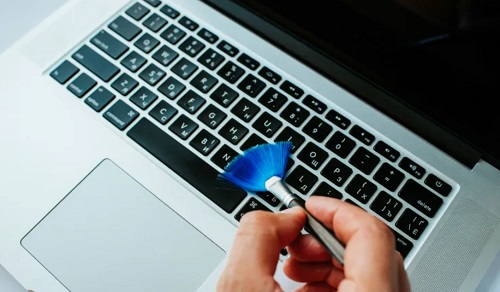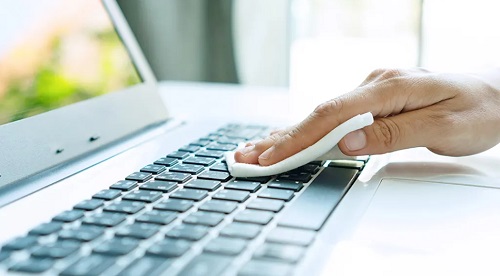Cleaning your laptop keyboard is crucial to maintain its functionality and hygiene. Dust, crumbs, and grime can accumulate between the keys, affecting their performance and potentially causing damage over time. A clean keyboard not only enhances your typing experience but also reduces the risk of spreading germs. In this guide, we’ll walk you through the steps on how to clean laptop keyboard effectively and safely. By following these essential tips, you’ll ensure your keyboard remains in top condition, extending its lifespan and improving your overall computing experience. So, let’s dive straight into the process of how to clean a laptop keyboard.

Why Should You Clean Your Laptop Keyboard?
Regularly cleaning your laptop keyboard is essential for several reasons. Firstly, a clean keyboard ensures that all keys function correctly. Dust and debris can cause keys to stick or malfunction, disrupting your work or gaming sessions. Secondly, your laptop keyboard can harbor bacteria and germs, posing a health risk, especially if you eat or drink near your laptop. Lastly, a clean keyboard enhances the overall aesthetics of your laptop, making it look well-maintained and professional. Understanding why you need to clean your laptop keyboard underscores the importance of integrating this task into your regular maintenance routine.
What Supplies Do You Need for Cleaning?
Gathering the right supplies is the first step in learning how to clean a laptop keyboard. You’ll need a few basic items: a can of compressed air to blow out debris, a soft brush or microfiber cloth to wipe down the surface, and a gentle cleaning solution, such as isopropyl alcohol or a mixture of water and mild dish soap. For deeper cleaning, consider using cotton swabs or a small, soft-bristled brush to reach between the keys. Having these supplies on hand ensures you can clean your laptop keyboard effectively without causing damage.

How to Clean Laptop Keyboard Safely?
Step 1: Turn Off and Unplug Your Laptop
Before you start cleaning your laptop keyboard, make sure to turn off your laptop and unplug it from any power source. This precaution is crucial to avoid any electrical damage or personal injury. Removing the battery, if possible, is also a good idea. With the laptop safely powered down, you can proceed to the next steps without worrying about accidental key presses or short circuits.
Step 2: Remove Loose Debris
Use a can of compressed air to blow away any loose debris from your keyboard. Hold the can at an angle and spray between the keys to dislodge dust and crumbs. For stubborn particles, gently tap the sides of the laptop to shake them loose. This step is vital in ensuring that you remove as much loose dirt as possible before moving on to more detailed cleaning.
Step 3: Wipe Down the Surface
Dampen a microfiber cloth with a minimal amount of your chosen cleaning solution. Make sure the cloth is just lightly damp, not wet, to avoid any liquid seeping into the keyboard. Gently wipe down the surface of the keys and the surrounding area. For a deeper clean, use cotton swabs dipped in the solution to clean between the keys. This step helps remove any smudges, fingerprints, and remaining dirt.
Step 4: Dry and Reassemble
After cleaning, allow your keyboard to air dry completely. Do not use the laptop until the keyboard is fully dry to avoid any electrical issues. If you removed the battery, reinsert it once everything is dry. Finally, power on your laptop and test the keys to ensure they are functioning correctly. This final step confirms that your cleaning process was successful and that your keyboard is ready for use.
Tips for Different Keyboard Types
Different keyboards may require specific cleaning approaches. For example, mechanical keyboards, often used by gamers, can be more robust and may allow for keycap removal, enabling a thorough cleaning. In contrast, membrane keyboards, commonly found on many laptops, require more delicate handling. If your laptop keyboard has backlighting, be cautious not to damage the lighting elements. Always refer to your laptop’s manual for any manufacturer-specific cleaning recommendations. Understanding these nuances ensures you clean your keyboard effectively without causing damage, regardless of its type.
What Are Common Mistakes to Avoid?
When cleaning your laptop keyboard, it’s important to avoid common mistakes that could cause damage. First, never spray cleaning solution directly onto the keyboard; instead, apply it to a cloth. Avoid using too much liquid, as it can seep into the keyboard and cause electrical issues. Also, refrain from using abrasive materials or harsh chemicals, which can damage the keys and surface. Finally, be gentle when using tools like brushes or compressed air to avoid dislodging or breaking keys. By steering clear of these mistakes, you’ll ensure a safe and effective cleaning process.
Conclusion
Learning how to clean laptop keyboard is a simple yet crucial task to maintain your laptop’s performance and hygiene. By regularly cleaning your keyboard, you ensure that it functions properly and reduces the risk of spreading germs. Remember to gather the right supplies, follow the safe cleaning steps, and avoid common mistakes. Incorporate these essential tips into your routine, and your laptop keyboard will remain in top condition for years to come. Keeping your keyboard clean enhances your overall computing experience and ensures your laptop stays in peak performance.
FAQs:
1. How do I clean my laptop keyboard without damaging it?
To clean your laptop keyboard without causing damage, turn off and unplug your laptop first. Use a can of compressed air to remove loose debris, then gently wipe the keys with a damp microfiber cloth. Avoid using excessive liquid and harsh chemicals.
2. Can I use alcohol wipes to clean my laptop keyboard?
Yes, you can use alcohol wipes to clean your laptop keyboard. Ensure the wipes are not overly saturated to prevent liquid from entering the keyboard. Alcohol wipes are effective in disinfecting and removing grime from the keys.
3. How often should I clean my laptop keyboard?
It’s recommended to clean your laptop keyboard at least once a month. If you eat or drink near your laptop, you may need to clean it more frequently to remove food particles and prevent sticky residue buildup.

0 Comments